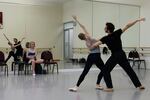
An OPB file photo of dancers with Oregon Ballet Theatre, which receives funding from the Regional Arts and Culture Council. Portland government provides most of the arts council's funding, and the city plans to cut off those funds.
Aaron Scott / OPB
For nearly 30 years, Portland has been the main funder of the Regional Arts and Culture Council, which in turn has been one of the main arts and culture grant-makers in the region. Portland Commissioner Dan Ryan announced last week that the city is going to end its contract with the Regional Arts and Culture Council, or RACC, after this fiscal year.
The contract with Portland makes up over $7 million of RACC’s $10.5 million total budget.
“We have been aware of certain tensions with the Council and the city of Portland,” said Carol Tatch, co-executive director of RACC. She said that RACC has been unable to get a meeting with Commissioner Ryan since city arts programs were added to his portfolio in January, despite multiple requests.
In announcing the break with RACC, Ryan issued a prepared statement that said: “This new model will enable the city to work with multiple service providers, establish stronger performance measures, and reduce its investment in loosely defined administration and overhead expenses.”
“We don’t have a loose administration here,” Tatch said. “All of our dollars are accounted for in our reports to the city and our reports to the counties. And our overhead is disastrously low. And I say disastrously because we do not ask for the government limits on what we could. And we have, over the years, understood that we have to short-shrift ourselves.”
Debby Garman, the treasurer and chair of RACC’s board, agreed: “The city has gotten a major bargain from the work that RACC has done on its behalf. The team at RACC … are experts with a lot of years behind them and connections with the depth of the arts community in the Portland metro area. I think they’re going to be hard-pressed to find people with that same skill set.”
Darion Jones, Senior Policy Advisor to Commissioner Ryan on Arts, Culture and Equity, said Portland’s relationship with RACC is not as collaborative as the city would like. “The costs that we are currently paying for management and administration are too high. Of the $4 million that the city of Portland sent to RACC this year from the general operating fund,” said Jones, “RACC spent more than $2 million of that on management and administrative expenses.”
Tatch pointed out that Portland now only has 11 months to scale up to do the work RACC has been doing for 30 years.
“RACC has worked over time to ensure that artists and creatives from every aspect of the diaspora have an opportunity to be funded, to have their voices lifted to participate,” Tatch said. “RACC was brought in, specifically, in the most recent years to ensure that our work was done with equity at a level that the city cannot maintain.”
Jeff Hawthorne, Arts Program Manager for the City of Portland, says Portland will still rely on other organizations to disburse grant money. “What we’d like to do is to break that contract down into smaller bite-size pieces and articulate a scope of work and clear accounting measures, accountability measures for those various scopes and send them out to bid,” said Hawthorne, “And RACC can compete for those contracts.”
Garman said she believes that without RACC’s expertise in community engagement, arts dollars in Portland will flow very differently.

RACC's menu of services includes distribution of arts tax revenues throughout Portland's school districts. The cash pays for art and music teachers like this class, in the Centennial district's Oliver Elementary.
Rob Manning / OPB
“The texture and richness of the Portland metro’s arts community will be diminished, honestly, unless RACC can figure out how to fill some of those gaps,” Garman said.
“With a reduction in administration costs to the Regional Arts and Culture Council, there will be more available funds to go out in the community,” said Jones. “The contract as a with RACC as a sole source provider is not working for the city. At this time, there is an opportunity to create more grant makers and people who can invest and reach artists that RACC currently hasn’t been able to reach.”
Tatch pointed out that RACC still has contracts with Multnomah, Washington and Clackamas counties, as well as Metro, the multi-county government agency. She said the RACC will simply have to be nimble and put the “pedal to the metal for our work with our fundraising space to ensure that we are still able to respond to the needs of our creatives in the community.”
Current and recently awarded RACC recipients will not be affected by this announcement.
